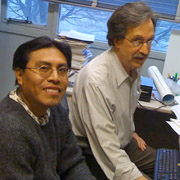Audio Slide-Show: The Kuna Celebrations
Photographs and narration by anthropologist James Howe
Anthropology at MIT
At MIT, anthropologists teach many students who will soon be serving as scientists and engineers in a global world. In the School's anthropology classrooms, these future leaders gain more understanding of the world's great diversity—of the many forms of culture, belief, and being.
Celebrations
In this audio slide-show, James Howe, Professor of Anthropology, tells the story of how a Kuna village prepares for and conducts a great communal celebration, an event that can last up to four days, and embodies many of the Kuna's important values, beliefs, and ways of life. The photographs are from the exhibit of Howe's images which were exhibted recently at the Museo Interoceánico del Canal, Panama's premiere museum.



Suggested Links
For all to see: MIT anthropologist debuts exhibit at Panama’s premier museum
Photos of celebration rituals among Panama’s Kuna people fascinate audiences—including the Kuna themselves.
MIT News
Howe documents native peoples' initiative in their own anthropology
In Chiefs, Scribes, and Ethnographers, Howe illuminates the dialogue at the heart of ethnography, and charts the Kuna's role in their own ethnography—a position that puts them at the forefront of anthropology's ongoing shift from an observational to a collaborative model.
More
MIT anthropology students assist with UN human rights review
A UN project to evaluate human rights in Panama received assistance from MIT Professor James Howe and the graduate students in his course, “Monitoring the Rights of Native Peoples."
More
MIT Anthropology
Anthropology's undergraduate offerings span a broad range of time and space: from ancient societies known from history and pre-history, to tribal and peasant communities, to contemporary industrial and scientific cultures. The graduate offerings in Anthropology focus on science and technology as part of the Doctoral Program in History, Anthropology, and Science, Technology and Society (HASTS).
More at Anthropology
